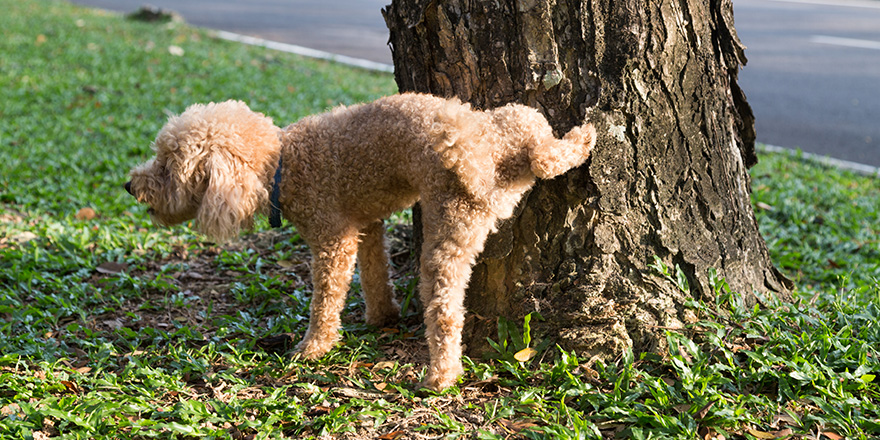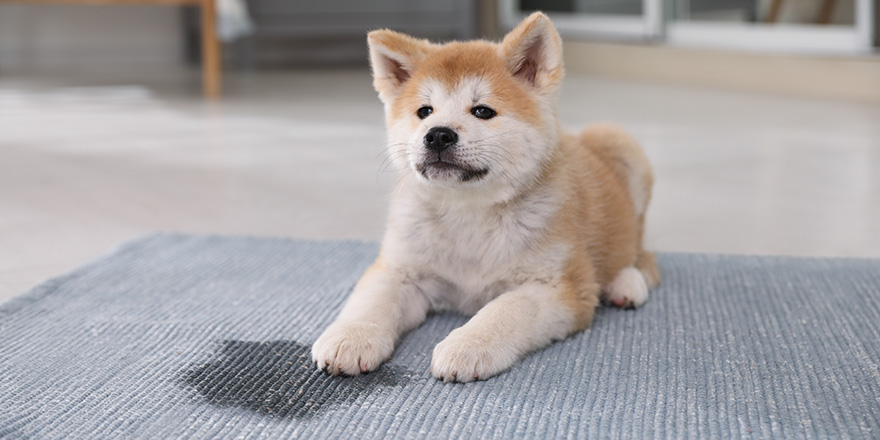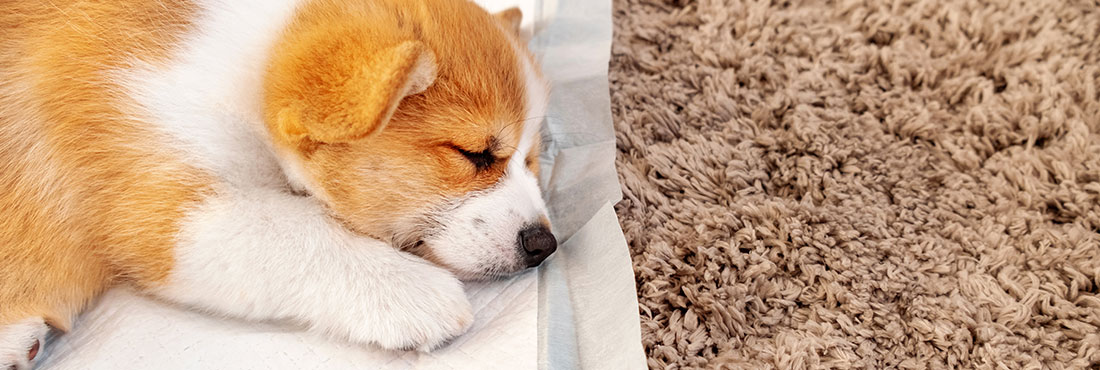Whether you are a veteran or a brand new dog owner, raising a puppy is hard work and can test your limits. As they learn and develop, you will have your hands full teaching them obedience and good behavior, tricks, and general house training.
So when you come home to find that your puppy has started peeing indoors, you may be wondering why. You may even be wondering ‘why is my puppy peeing every 5 minutes?’, is it a medical concern or a behavioral problem? We have done the research in hopes to narrow down why your puppy may be peeing a lot and how to get them to stop.
How Often Do Puppies Pee?
Moreover, how often should puppies pee, and what is considered an excessive amount? Young puppies will have very poor bladder control and will therefore need to go potty at least every hour. According to the AKC, as they grow to about nine months, a puppy will generally be able to hold their bladder for the number of hours equal to their age in months.
For example, a one-month-old puppy will need to go potty every hour, a two-month-old will have to go every couple of hours, a seven-month-old will need to go every seven hours, and so on until they reach nine months.

Is it Normal for Puppies to Pee a Lot?
With the guideline above in mind, it’s important to know that puppies will go when they need to and will usually need to go up to 30 minutes after guzzling down water. However, it’s always worth seeing a vet for advice and assistance if your puppy is going more than expected. Excessive urination can be a telltale sign of serious medical issues or can even imply behavioral complications.
Health Problems
If if you’re feeling as if your puppy is peeing frequently it’s important to check for a potential health problem first. This process isn’t an easy one, as you may have to provide a urine sample or blood work, but it’s crucial that these are either ruled out or identified as early as possible in order for your vet to start treatment.
Puppies can pee frequently due to medical conditions such as diabetes, liver disease, or kidney disease but it can also be a sign of bladder infections or stones. Below is a breakdown of some of the common conditions including physical symptoms to look for if you suspect a medical ailment is affecting your dog’s health.
Urinary Tract Infection
Frequent urination could be an indication of a urinary tract infection which can be treated easily but can also imply more serious medical conditions such as diabetes, kidney disease, or cancer. Urinary tract infections are the result of bacteria invading the urethra and can be treated with antibiotics or other medications prescribed by your vet.
When dogs get urinary tract infections they can find it difficult to hold it in. If a puppy somehow gets one, this can be even more difficult due to the bladder’s smaller size. There are a few clear signs of a UTI and can be usually identified by the following symptoms:
- Straining whilst urinating
- Crying or whimpering while urinating
- Bloody/cloudy urine
- Frequently licking around the urinary opening
- Accidents in the house or needing to go outside to pee a lot
- A strong odor to the urine
In order for a vet to identify a UTI, they may need to run some initial tests to check the kidneys and bladder. Depending on their findings this may lead to more evaluations to possibly uncover a more serious issue such as those listed previously.
Canine Diabetes
Urinary tract infections can often be a sign and symptom of diabetes as, unfortunately, dogs are not exempt from the incurable disease. Diabetes is where the pancreas either produces little insulin for the body to make use of or where it produces some of the hormones, but the body doesn’t acknowledge or utilize them.
Either way, the dog’s bloodstream builds up sugar which the body can’t make use of and as a result, the body will start to break down and damage various organs such as the kidneys and heart. Symptoms of diabetes include increased thirst, frequent peeing, weight loss, and an increased appetite.
Fortunately, dog owners are able to manage the disease well after receiving veterinary advice and assistance. If you want to find out more about diabetes in dogs, take a look at this in-depth article available on My Pet Needs That.
Kidney Infection
This infection may not be so obvious to begin with but can be a cause of frequent urination in dogs. Kidney infections can be caused by a few things including kidney stones or parasites and can often be recognized by the following symptoms:
- Excessive urination
- Odorous urine
- Stomach pain
- Loss of appetite (Followed by lethargy)
- Blood present in urine
- Discolored urine
Bladder Stones
Bladder stones can start small but become enlargened over time and affect both female and male dogs. The presence of these stones will continuously give your puppy the sudden urge to pee and will therefore cause unexpected accidents inside the home. The symptoms of these will resemble the signs of the conditions above:
- Numerous attempts to urinate (but not produce any)
- Discolored urine
- Frequent licking of the urinary opening
- Urinary accidents
- Straining when urinating
If left untreated, bladder stones can be immensely painful and fatal if they obstruct the urine from coming out of the bladder.
It is important that you seek the attention of a vet if you see any signs of the medical issues above. If left untreated, all can have extremely harrowing and fatal outcomes. It’s unlikely that a young puppy will develop such serious issues but it’s not impossible, so make sure to start here if you’re looking to find out why your puppy is peeing a lot.
You may also like our article on: Why is My Dog Peeing in His Sleep?
Behavioral Problems
If a medical problem is ruled out the problem could revolve around behavior issues instead. Behavioral-related peeing is common in young pups and can occur for a number of reasons whether they’re testing boundaries, missing their dog owners, or as a submissive reaction to seeing you or someone new. Below we’ll break down the most common reasons and follow up with some helpful tips and information.
Anxiety
Puppies can often pee accidentally when experiencing anxiety or stress. When they are especially young they can experience separation anxiety when you leave them home alone. Sometimes, these frequent accidents are often accompanied by defecation as well as excessive barking or destruction of belongings.
A drastic change in their environment can also cause anxiety in dogs which can trigger them to urinate frequently. If they are especially nervous they could even find the presence of other animals or larger dogs to bed intimidating.
Mark Territory
Marking is common in dogs that have yet to be spayed or neutered as they often do this to attract a mate upon entering sexual maturity. As they get older, puppies may start to mark items, furniture, or floors to put their own scent on them to claim ownership.
In addition to this, when a puppy or adult dog catches the faint odor of another canine, either on walks or in the home, they may act on the urge to cover it with their own scent. If this happens in the home, you can usually get them to stop peeing by thoroughly cleaning the area they seem to favor. However, a dog’s sense of smell is better than our own, so they can pick up on smells that go unnoticed to us, so you’ll have to pay special attention to the area to ensure the original odor is eradicated.
Incomplete Training
House and potty training your puppy is a difficult journey but can be tougher when the type of dog is known to be particularly headstrong. Some dog breeds can be notoriously stubborn making the training process longer than usual so it’s important to persist with rules and coaching otherwise you may still find yourself stepping in the occasional puppy pee puddle.
With this in mind, the potty training process will teach puppies about bladder control. They may find it difficult to hold when they are young as they won’t have complete control but as you continue they will pick it up over time.
For more information on potty training, including when to start and how long it should take on average, take a look at this guide on the best way to potty train your puppy.
Seeking Attention
Puppies tend to act out and leave ‘gifts’ if they are bored and don’t have a lot to stimulate them. Interactive toys, long walks, plenty of playtime, and visits to the dog park are all great ways to keep them occupied.
Acknowledging The Alpha Dog
Believe it or not, a dog can often pee as a way of showing submission. At a young age, this can mostly be because they are reacting to authority or even because they are shy.
Recently adopted puppies can accidentally void their bladder because of trauma if they have experienced any. Rescue dogs are more likely to develop constant urination as a reaction to authority to show someone they are submissive.

Helpful Tips and Other Things to Consider
As we know by now, dog ownership is no easy task, especially in their early years but the more you know the more confident you will be. It can be particularly daunting when potentially facing a medical problem and can be frustrating trying to simply improve your puppy’s behavior.
Now we’ve addressed the health and behavioral hurdles you may face, we now have a list of extra tips and advice that could potentially make training easier in the hopes that your puppy will have fewer accidents in the future.
Schedule
When you house train your puppy you may want to regulate their potty schedule so they know when to expect their next toilet break. These breaks should happen at the same time every day and could be incorporated into daily walks. At first, when they are young, you cannot expect them to be able to hold their urine as your puppy’s bladder is particularly small but as they grow they will be able to hold their bladders better in time for their potty breaks.
Longer Potty Breaks
If you’re finding that your puppy still leaves some small puddles after a walk or break, you may need to leave them outside a little longer as they potty train. This is because they may need a little more time for the urge to be triggered and that you may be calling them inside prematurely.
Watch Their Water Intake
It could be useful to only put out your puppy’s water bowl when they are being fed or when necessary. After they are done drinking, take the bowl away. Your puppy will need to pee around 30 minutes after taking a drink so make sure you let them go around this time.
Hire a Dog Walker
Sometimes your dog may need more moments throughout the day to relieve themselves and some owners simply cannot come home during work hours to let them out. Dog walkers are a great solution whether you have young pups or senior dogs as they will not only provide the opportunity for dogs to pee but it will also give them some extra exercise.
Crate Training
Dog training can offer great benefits to owners and puppies. Crate training, in particular, offers a safe space to those dogs who may be more nervous or anxious than others but can also be a great tool when potty training too. Offering a dog with separation anxiety a comfortable place to go when you leave, may reduce the likelihood of them leaving messes.
Puppies that are taught to use their crate as a safe sleeping environment are also less likely to pee inside it as this is where their bed is. By using a crate you can helpfully teach them how to hold their bladder but always be sure to let them out of the crate to pee at the appropriate times to avoid accidents.
Diapers (Females) or Belly Bands (Males)
In severe cases, you may have to resort to one of these methods to reduce the messes around your home. Sometimes, you can’t stop the frequent urination but by using a diaper or belly band you can protect floors and furniture. Owners with older dogs tend to rely on these when their dog has a health condition or simply finds it difficult to hold their bladders in their old age.
Previous Odors
When your dog pees inside the house or in their crates make sure to clean it up as soon as possible. It is important to clean up every spill and make sure to rid the area of residual odor so they are less likely to find the same spot and mark over the scent of dog pee with a fresh one.






